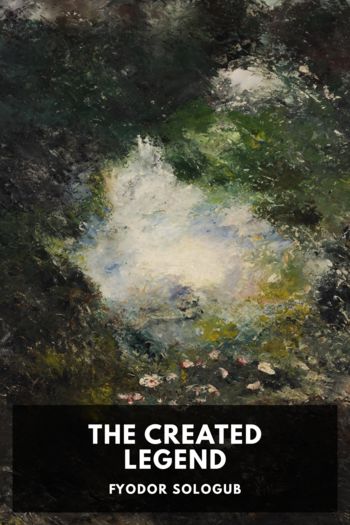The Created Legend - Fyodor Sologub (easy to read books for adults list TXT) 📗

- Author: Fyodor Sologub
Book online «The Created Legend - Fyodor Sologub (easy to read books for adults list TXT) 📗». Author Fyodor Sologub
Prince Davidov frowned. His black eyes flared up. He asked again:
“Why have you done all this? The body of the malefactor and the soul of an innocent—why should you have it all?”
Trirodov, looking angrily at his visitor, said resolutely:
“My design has been daring and difficult—but have I alone suffered from despondency, suffered until I perspired with blood? Do I alone bear within me a dual soul, and unite in me two worlds? Am I alone worn out by nightmares as heavy as the burdens of the world? Have I alone in a tragic moment felt myself lonely and forsaken?”
The visitor smiled a strange, sad, tranquil smile. Trirodov continued:
“You had better know that I will never be with you, that I will not accept your comforting theories. All your literary and preaching activity is a complete mistake. I don’t believe anything of what you say so eloquently, enticing the weak. I simply don’t believe it.”
The visitor was silent.
“Leave me alone!” said Trirodov decisively. “There is no miracle. There was no resurrection. No one has conquered death. The establishment of a single will over the inert, amorphous world is a deed not yet accomplished.”
Prince Davidov rose and said sorrowfully:
“I will leave you alone, if you wish it. But you will regret that you have rejected the path I have shown you—the only path.”
Trirodov said proudly:
“I know the true path—my path.”
“Goodbye,” said Prince Davidov simply and calmly.
He left—and in a little while it seemed that he had not been there. Lost in painful reflections, Trirodov did not hear the noise of the departing carriage; the unexpected call of the dark-faced, fascinating visitor, with his flaming speech and his fiery eyes, stirred his memory like a midday dream, like an abrupt hallucination.
“Who is his fiancée, and why is she here?” Trirodov asked himself.
A strange, impossible idea came into his head. Did not Elisaveta once speak about him with rapture? Perhaps the unexpected visitor would take Elisaveta away from him, as he had taken her from Piotr.
This misgiving tormented him. But Trirodov looked into the clearness of her eyes on the portrait taken recently and at the grace and loveliness of her body and suddenly consoled himself. He thought:
“She is mine.”
But Elisaveta, musing and burning, was experiencing passionate dreams; and she felt the tediousness of the grey monotony of her dull life. The strange vision suddenly appearing to her in those terrible moments in the wood repeated itself persistently—and it seemed to her that it was not another but she herself who was experiencing a parallel life, that she was passing the exultantly bright, joyous, and sad way of Queen Ortruda.
EndnotesAlso the scene of Sologub’s Little Demon. ↩
Footpath of the dead. ↩
This word, which is the Russian equivalent for Ham of the Bible, describes a man in a state of serfdom. Since the abolition of serfdom in Russia, it has come to define the plebeian; and is a sort of personification of the rabble. The satirist Stchedrin has defined Kham as “one who eats with a knife and takes milk with his after-dinner coffee.” Merezhkovsky has written a book on Gorky under the title of The Future Kham. —Translator ↩
Bossiak literally means “a barefooted one,” but may be more freely translated a “tramp.” This type has come very much into vogue since Gorky has put him into his stories. —Translator ↩
This phrase signifies punishment inflicted by the authorities without a trial. ↩
The name by which the members of the Constitutional Democratic Party are known. It is a development of the initials “C.D.” ↩
Reference to the identity of the Black Hundred. ↩
See note 3. ↩
The Black Hundred. ↩
Betty. ↩
Nickname for Social Democrats. ↩
Nickname for Social Revolutionaries. ↩
A political party of moderate liberals which owes its name to the fact that on October 17, 1905, the Russian Constitution was established and the Duma organized. ↩
Member of the Social Democratic Party. ↩
See note 2. ↩
See note 3. ↩
Whips. ↩
Members of the Social Revolutionary Party are supposed to wear black shirts, those of the Social Democratic Party red. ↩
Forest fires are one of the numerous problems of Russia. They seem to be difficult to put out, and sometimes go on for weeks. Hence the numerous references in the following pages to the constant odour of forest flames. ↩
These two Greek Fates are important and recurring symbols in Sologub’s philosophy. The world of Aisa is the world of chaos and chance, in which man is too often lost in trying to emerge from it. The people who belong to Ananke are those who, acting of necessity, define their world clearly and conquer chaos. Theirs is the immutable truth. See also Introduction. ↩
A line from a poem by Pushkin. ↩
Siberian island famous for its prison. ↩
Usually brought along as witnesses. ↩
I have it on the authority of one who was of the party that it actually took place at the house of a celebrated living poet in St. Petersburg. The lost cap belonged to Dmitry Merezhkovsky, who immediately wrote a much-discussed article in an important newspaper under the title of “What has become of our Cap?” The above is an actual quotation from it. The sarcastic remark about “throwing back the enemy” is aimed at those “patriots” who used to say that all Russians had to do to repel foreign enemies was to throw their caps at them.





Comments (0)